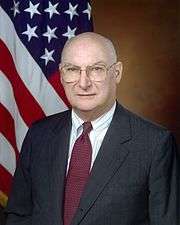Andrew Marshall (foreign policy strategist)
| Andrew Marshall | |
|---|---|
 | |
| Born |
13 September 1921 Detroit, Michigan, United States |
| Nationality | United States |
| Institution |
University of Chicago Rand Corporation Office of Net Assessment |
| Field | Systems Analysis |
| Alma mater |
University of Detroit Wayne State University University of Chicago (M.A., 1949) George Washington University |
Andrew W. Marshall (born September 13, 1921)[1] is an American foreign policy strategist who served as director of the United States Department of Defense's Office of Net Assessment from 1973 to 2015. Appointed to the position by President Richard Nixon, Marshall remained in office during all successive administrations that followed until his retirement on January 2, 2015.[2][3][4] He was succeeded in the role by James H. Baker.[5]
Biography
Raised in Detroit, Marshall pursued autodidactic interests in history, literature and the natural and social sciences from a young age. He graduated from Cass Technical High School (where he trained in machining and received the second-highest score on a citywide aptitude test for honors students similar in provenance to the SAT) in 1939. After briefly working in a factory and attending the University of Detroit for a year, he dropped out to take a position at the Murray Body Company, where he manufactured machine tools used in fabricating British airplane parts. Unable to serve in World War II due to a heart murmur, Marshall continued to work at Murray for the remainder of the war. He eventually resumed his formal studies at Wayne State University in 1943.
Marshall was admitted to the University of Chicago with graduate standing in 1945; under the chancellery of Robert Maynard Hutchins, students who were not enrolled in the generalist "Chicago Plan" undergraduate program pursued a course of study that led to a master's degree instead of the baccalaureate. Strongly influenced by Friedrich Hayek, he earned an M.A. in economics from the institution in 1949. His master's thesis was a sensitivity analysis of Lawrence Klein's econometric model of the US economy; influential for its methodology, it has never been published except for a short abstract.[6][7][8]
After electing to defer his studies in favor of eventually pursuing a Ph.D. in statistics (a program not yet offered by the University of Chicago), Marshall joined the RAND Corporation, the original "think tank," at the behest of mentor W. Allen Wallis in 1949. While he would briefly return to academia to cover Wallis's courses during the 1953-1954 term and continued to take statistics courses at George Washington University, Marshall soon gained the cachet of being part of "a cadre of strategic thinkers" that coalesced at the RAND Corporation in the 1950s and 1960s, a group that also included Charles J. Hitch, Herman Kahn, James Schlesinger and Daniel Ellsberg. Notably, he worked with Kahn on developing and advancing Monte Carlo methods.
Schlesinger would later become the U.S. Secretary of Defense and personally oversaw the creation of the Office of Net Assessment. The original main task of the office was to provide strategic evaluations on nuclear war issues. James Roche, Secretary of the Air Force in the administration of George W. Bush, worked for Marshall during the 1970s.[9]
Andrew Marshall was consulted for the 1992 draft of Defense Planning Guidance (DPG), created by then-Defense Department staffers I. Lewis Libby, Paul Wolfowitz, and Zalmay Khalilzad; all of the aforementioned would ascend to influential roles in the administration of George W. Bush.
- General Chen Zhou, PLA[10]
Marshall has been noted for fostering talent in younger associates, who then proceed to influential positions in and out of the federal government: "a slew of Marshall's former staffers have gone on to industry, academia and military think tanks."[11] Dick Cheney, Donald Rumsfeld, and Wolfowitz, among others, have been cited as Marshall "star protégés."[12]
In an interview in 2012 the main author of four of the Chinese defence white papers General Chen Zhou stated that Marshall was one of the most important and influential figures in changing Chinese defence thinking in the 1990s and 2000s.
Foreign Policy named Marshall one of its 2012 Top 100 Global Thinkers, "for thinking way, way outside the Pentagon box".[13]
References
- ↑ Perry, Penny (2008). Federal Staff Directory 2009/Winter. CQ Press. p. 1395. ISBN 0872892514.
- ↑ "Pentagon weighs future of its inscrutable nonagenarian futurist, Andrew W. Marshall". Washington Post. October 28, 2013. Retrieved 2013-12-10.
- ↑ "Yoda still standing: Office of Pentagon futurist Andrew Marshall, 92, survives budget ax". Washington Post. 4 December 2013. Retrieved 2013-12-10.
- ↑ "The quiet American". The Economist. ISSN 0013-0613. Retrieved 2015-07-21.
- ↑ "DoD Announces Appointment of James Baker as Director of the Office of Net Assessment". U.S. DEPARTMENT OF DEFENSE. Retrieved 2016-01-01.
- ↑ Marshall, A. W. (1950). "A Test of Klein's Model III for Changes of Structure". Econometrica. 18 (3): 291. JSTOR 1905802.
- ↑ Qin, Duo (1993). The Formation of Econometrics: A Historical Perspective. Clarendon Press. pp. 137–138. ISBN 0-19-828388-1.
- ↑ Christ, Carl F. (1994). "The Cowles Commission's Contributions to Econometrics at Chicago, 1939–1955". Journal of Economic Literature. 32 (1): 30–59. JSTOR 2728422.
- ↑ Lehman, Nicholas. "Dreaming About War." The New Yorker, July 16, 2001.
- ↑ "The dragon's new teeth". The Economist. Apr 7, 2012. Retrieved April 6, 2012.
- ↑ Silverstein, Ken. "The Man from ONA." The Nation, October 25, 1999.
- ↑ McGray, Douglas (February 2003). "The Marshall Plan". Wired. Archived from the original on 6 September 2014. Retrieved 20 July 2015.
- ↑ "The FP Top 100 Global Thinkers". Foreign Policy. 26 November 2012. Archived from the original on 28 November 2012. Retrieved 28 November 2012.
Further reading
- Andrew F. Krepinevich, Barry D. Watts. The Last Warrior: Andrew Marshall and the Shaping of Modern American Defense Strategy (New York: Basic Books, 2015). 337 pp. online review
External links
| Wikiquote has quotations related to: Andrew W. Marshall |
- Journalism coverage of Andrew W. Marshall.
- Works by or about Andrew Marshall in libraries (WorldCat catalog)